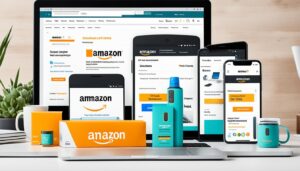Welcome to our comprehensive guide on private label product research! If you’re looking to build a successful private label business, understanding the key strategies involved in product research is crucial. In this article, we will explore the importance of private label product analysis, along with effective product sourcing strategies that can help you make informed decisions and achieve business growth.
Key Takeaways:
- Private label product research plays a vital role in the success of your private label business.
- Analyzing competition, generating and validating product ideas, and considering pricing and customization options are essential parts of the research process.
- Strategic thinking and product positioning are important aspects of private label product research.
- Trend analysis and idea validation are crucial steps to identify profitable opportunities in the market.
- Selecting reliable suppliers and building your own brand are strategic decisions that impact the quality and success of your private label products.
Strategic Thinking in Private Label Product Research
Strategic thinking plays a crucial role in private label product research. To maximize your chances of success, it is important to consider various elements such as product positioning, competition environment, and the impact of product families on sales.
Product positioning is key in differentiating your private label products from competitors. By understanding the unique value proposition of your products, you can effectively communicate their benefits to your target audience and create a competitive advantage.
Furthermore, analyzing the competition environment is essential for identifying market opportunities. By assessing the strengths and weaknesses of your competitors, you can position your products in a way that addresses gaps in the market and appeals to consumer needs.
When conducting private label product research, it’s important to think strategically about the family of products you offer. By considering how different products within your portfolio can complement and support each other, you can drive sales and increase customer loyalty.
The Power of Strategic Thinking
“Strategic thinking allows you to align your private label products with market demand, differentiate yourself from competitors, and leverage the strengths of your product portfolio.”
By applying strategic thinking to your private label product research, you can position your brand for success and create a compelling offering in the competitive marketplace.
Generating Product Ideas for Private Label Products
One of the key steps in private label product research is generating unique and profitable product ideas. This process involves using your own experience, anticipating trends, and analyzing market demand. By doing so, you can identify lucrative niches and create a successful private label brand.
To generate product ideas, consider the following strategies:
- Tap into your own experience: Take advantage of your personal interests, hobbies, and expertise to come up with product ideas. Think about products that you personally use and find useful or those that are missing from the market.
- Anticipate trends: Stay up to date with industry trends and consumer preferences. Research emerging technologies, social media discussions, and popular culture to identify potential product opportunities.
- Monitor social media: Social media platforms are valuable sources of inspiration. Pay attention to what people are talking about, the problems they face, and the products they admire or desire. Engage with relevant communities and observe the discussions taking place.
- Explore crowdfunding platforms: Platforms like Kickstarter and IndieGoGo showcase innovative product ideas that are yet to hit mainstream markets. Monitor these platforms to discover unique product concepts and identify potential gaps in the market.
- Conduct trend analysis: Analyze market and consumer trends to identify underserved niches and untapped opportunities. Look for areas where demand is high but supply is limited, allowing you to fill the gap with your private label products.
By utilizing these strategies, you can generate product ideas that are aligned with market trends, consumer preferences, and your own interests. Remember that thorough research and analysis are vital to identify viable product ideas that have the potential to succeed in the private label market.
Quote: “Finding the right product ideas is like finding the missing piece of the puzzle. It requires creativity, market awareness, and a deep understanding of customer needs.” – Jane Henderson, E-commerce Expert
| Strategy | Benefits |
|---|---|
| Tapping into personal experience | – Leverage your expertise and passion – Understand customer needs – Identify unique product opportunities |
| Anticipating trends | – Stay ahead of the competition – Capitalize on emerging markets – Tap into growing consumer demand |
| Monitoring social media | – Stay connected to customer preferences – Identify emerging trends and conversations – Discover niche product ideas |
| Exploring crowdfunding platforms | – Find innovative product concepts – Identify gaps in the market – Gauge customer interest before investing |
| Conducting trend analysis | – Identify underserved niches – Uncover potential market opportunities – Align products with high demand |
Utilizing these strategies in your private label product research will help you generate ideas that have the potential to resonate with customers and drive profitability. Remember to continuously analyze market dynamics, evaluate customer preferences, and adapt your product ideas accordingly.
Validating Private Label Product Ideas
Once you have generated a list of potential product ideas, it’s crucial to validate them before making a final decision. Validating your ideas involves conducting market research to assess their feasibility, demand, and competition. Additionally, you need to calculate the pricing to ensure profitability for your private label business.
Market research allows you to gain insights into the current market conditions, consumer preferences, and the competitive landscape. By understanding the demand and competition for each product idea, you can evaluate their potential success and make informed decisions. Furthermore, market research helps you identify potential gaps in the market that you can exploit with your private label products.
Price calculation is another essential aspect of the validation process. It’s important to ensure that the pricing of your private label products aligns with market standards, and you can achieve a satisfactory profit margin. Consider factors such as production costs, packaging, shipping, and any additional expenses when calculating the price for each product idea.
By validating your product ideas through market research and price calculation, you can narrow down your options and choose the most viable products for your private label business. This process reduces the risk of investing in products that may not perform well in the market and maximizes the chances of success for your private label brand.
Benefits of Validating Ideas:
- Minimizes the risk of investing in unprofitable products.
- Allows you to assess market demand and competition for each product idea.
- Enables you to calculate pricing to ensure satisfactory profit margins.
- Helps you identify market gaps and opportunities for differentiation.
Validating your private label product ideas is a crucial step in building a successful and profitable private label brand. It ensures that you invest your resources in products that have the potential to resonate with your target market and generate substantial returns on investment.
“Validating your product ideas through market research and price calculation helps minimize the risk of investing in unprofitable products and maximizes your chances of success in the private label business.”
| Steps to Validate Private Label Product Ideas | Benefits |
|---|---|
| 1. Conduct thorough market research | – Gain insights into market demand and competition – Identify market gaps and opportunities |
| 2. Calculate pricing and profit margins | – Ensure profitability and sustainable growth – Define competitive pricing strategies |
| 3. Evaluate feasibility and demand | – Make informed decisions based on market insights – Avoid investing in low-demand products |
Selecting Suppliers for Your Private Label Products
When it comes to launching your private label products, selecting reliable suppliers is a critical step in ensuring the success of your business. Choosing the right suppliers can make a significant impact on the quality, cost, and customizability of your products. Here are some key factors to consider when selecting suppliers for your private label products:
Customizability
Customizability is an essential aspect to consider when choosing your suppliers. Customization options allow you to add your own branding, packaging, and unique touches to your products, helping you create a distinct and memorable brand. Seek suppliers who offer this flexibility, as it enables you to tailor your products to meet your specific market needs and target audience.
Price per Unit
Price is a crucial factor to consider when selecting suppliers. While it’s important to find affordable options, it’s equally essential to balance cost with quality. Remember, your private label products serve as a representation of your brand. Opting for the cheapest supplier may compromise the overall quality and value of your products. Conduct thorough research and compare prices to ensure you find suppliers offering competitive rates without compromising on quality.
Minimum Order Quantity
Minimum order quantity (MOQ) refers to the minimum number of units you must order from a supplier. Take into account your budget, storage capacity, and expected demand for your products when determining the ideal MOQ. Optimizing your order quantity can help you manage inventory efficiently and prevent any potential stockouts or excess inventory, ensuring a smooth supply chain.
Ability to Meet Customization Requirements
Ensure that your chosen suppliers have the capabilities to meet your desired customization requirements. This includes aspects like the use of specific materials, production techniques, and packaging options. Establish clear communication with suppliers to ensure they understand your vision and can deliver the customized products that align with your brand identity.
| Factors to Consider | Suppliers A | Suppliers B | Suppliers C |
|---|---|---|---|
| Customizability | Yes | No | Yes |
| Price per Unit | $$ | $ | $$$ |
| Minimum Order Quantity | 500 units | 100 units | 1000 units |
| Ability to Meet Customization Requirements | Excellent | Good | Excellent |
By carefully considering these factors and evaluating potential suppliers, you can make informed decisions that align with your private label product goals. Remember, the right suppliers will not only meet your quality and customization requirements but also ensure the timely delivery of your private label products.
Building Your Own Brand in Private Label Product Research
Building your own brand is a strategic decision in private label product research. Having your own brand can create trust among customers and help differentiate your products from competitors. It also offers opportunities for cross-selling and generating higher sales. Registering your brand as a trademark can provide legal protection and enhance your brand’s credibility in the market.

Establishing your own brand is a vital step in private label product research. By creating a unique brand identity, you can build customer loyalty and stand out in the market. This involves creating a brand name, logo, and visual identity that resonates with your target audience.
“Having your own brand allows you to create a narrative and an emotional connection with customers. It gives you the opportunity to tell a story and establish a brand experience that sets you apart.”
One way to differentiate your brand is through product packaging. Eye-catching, well-designed packaging can make your products more appealing to customers and help them recognize your brand immediately. Consider investing in professional packaging design to create a memorable first impression.
Brand Differentiation Strategies:
- Create a distinctive brand name that reflects your values and resonates with your target audience.
- Develop a unique brand story that sets you apart from competitors.
- Design memorable packaging that catches the customer’s attention.
- Use brand colors and logo consistently across all marketing materials.
- Build a strong online presence through a well-designed website and engaging social media channels.
- Provide exceptional customer service to foster positive brand experiences.
Benefits of Building Your Own Brand:
- Establishing trust and credibility with customers.
- Creating a unique identity and differentiation in the market.
- Opportunities for cross-selling and expanding product lines.
- Higher customer loyalty and repeat purchases.
- Increased perceived value and ability to command premium pricing.
Ultimately, building your own brand sets the foundation for long-term success in the private label business. It enables you to create a unique identity that resonates with your target audience and differentiates you from competitors.
| Brand Differentiation Strategies | Benefits of Building Your Own Brand |
|---|---|
| Create a distinctive brand name | Establish trust and credibility with customers |
| Develop a unique brand story | Create a unique identity and differentiation in the market |
| Design memorable packaging | Opportunities for cross-selling and expanding product lines |
| Use brand colors and logo consistently | Higher customer loyalty and repeat purchases |
| Build a strong online presence | Increased perceived value and ability to command premium pricing |
| Provide exceptional customer service |
Intellectual Property Considerations in Private Label Product Research
When building your own brand in private label product research, it is crucial to understand and consider intellectual property rights. Protecting your brand and preventing others from using it can help ensure the long-term success of your business. This section will cover important considerations such as conducting trademark research and the registration process.
Trademark Research: Protecting Your Brand Identity
Before finalizing your desired brand name, it is essential to conduct thorough trademark research. This step helps you ensure that your chosen brand name is not already registered by someone else in the relevant category. By conducting trademark research, you can avoid potential legal disputes and protect your brand identity.
Trademark research involves searching relevant trademark databases and reviewing existing trademarks. Look for trademarks that are similar or identical to your brand name and analyze their scope of protection. This research will help you assess the availability and distinctiveness of your desired brand name.
There are various online resources available to conduct trademark research, including:
- The United States Patent and Trademark Office (USPTO) database
- The European Union Intellectual Property Office (EUIPO) database
- Global trademark databases like WIPO’s Global Brand Database
By utilizing these resources, you can gain insights into existing trademarks and make an informed decision about the registration of your brand name.
Trademark Registration: Legal Protection for Your Brand
Once you have conducted thorough trademark research and ensured the availability of your brand name, the next step is to register your trademark. Trademark registration provides legal protection and exclusive rights to use your brand name in association with your products or services.
Registering your trademark grants you several benefits:
- Legal protection against unauthorized use of your brand
- Preventing others from using similar or identical brand names
- Enhancing your brand’s credibility and reputation
The registration process may vary depending on the country and region. In general, it involves submitting an application to the appropriate intellectual property office, such as the German Patent and Trademark Office. The application typically requires details about your brand name, its specific category, and your intention to use the trademark.
Trademark registration can be a complex process, and it is advisable to consult patent attorneys or trademark experts for guidance. They can assist you with the application process, handle any legal requirements, and ensure a smooth registration.
Protecting your brand through trademark registration is an important step in private label product research. It not only safeguards your intellectual property but also reinforces your brand’s unique identity and market position.
Selling Private Label Products on Amazon
One popular platform for selling private label products is Amazon. With its vast customer base and efficient fulfillment process, Amazon offers great opportunities for private label sellers. By utilizing Amazon’s Fulfilled-by-Amazon (FBA) program, you can streamline the handling and shipping of your products, allowing you to focus on growing your business.
To successfully sell private label products on Amazon, it’s important to optimize your product’s visibility and maximize sales. Creating a compelling Amazon listing is key in attracting potential customers. Leveraging tools like Jungle Scout’s Chrome Extension can provide valuable insights into keywords, competition analysis, and pricing strategies.
When selling on Amazon, careful product selection is crucial to stand out in a highly competitive marketplace. Conduct thorough research to identify profitable niches, analyze customer demand, and evaluate the competition. Additionally, strategic pricing is essential to ensure profitability while remaining competitive.
Effective marketing is also instrumental in driving sales on Amazon. Utilize Amazon’s advertising options, such as Sponsored Products and Sponsored Brands, to increase visibility and reach a broader audience. Implementing proven marketing strategies like search engine optimization (SEO) and social media promotion can further boost your product’s exposure.
Advantages of Selling Private Label Products on Amazon:
- Access to a vast customer base
- Streamlined fulfillment through Amazon FBA
- Opportunities for visibility through Amazon’s advertising options
- Potential for high sales volume
Challenges of Selling Private Label Products on Amazon:
- Intense competition from other sellers
- Constantly evolving marketplace dynamics
- Increasing advertising costs
- Managing inventory and logistics effectively
| Advantages | Challenges |
|---|---|
| Access to a vast customer base | Intense competition from other sellers |
| Streamlined fulfillment through Amazon FBA | Constantly evolving marketplace dynamics |
| Opportunities for visibility through Amazon’s advertising options | Increasing advertising costs |
| Potential for high sales volume | Managing inventory and logistics effectively |
Selling private label products on Amazon provides a lucrative opportunity to reach a vast customer base, streamline fulfillment, and optimize sales. However, it’s important to be aware of the challenges, such as intense competition and evolving marketplace dynamics. By carefully selecting products, implementing effective marketing strategies, and consistently monitoring and adapting your approach, you can succeed in selling private label
Pros and Cons of Private Label Product Research
Private label product research offers numerous advantages and disadvantages. By understanding these pros and cons, you can make informed decisions and navigate the competitive landscape effectively.
Pros of Private Label Product Research
- The ability to skip the product development process: With private label products, you can save time and bypass the lengthy and complex process of creating a new product from scratch.
- Create unique offerings: Private label products allow you to differentiate yourself from competitors by customizing and branding products according to your target market’s preferences and needs. This gives you a competitive edge and enhances brand recognition.
- Opportunity to enter the market faster: With private label products, you can swiftly launch products into the marketplace, capitalizing on existing demand and trends.
Cons of Private Label Product Research
- Need for competitive analysis: Conducting thorough competitive analysis is crucial in the private label industry. By understanding your competitors’ offerings, pricing strategies, and marketing tactics, you can position your products effectively and identify gaps in the market.
- Managing supplier relationships: Private label products rely on suppliers to manufacture and deliver the products. Building and maintaining strong relationships with suppliers is essential to ensure consistent product quality, timely deliveries, and reliable partnerships.
- Ensuring product quality: As a private label brand owner, you are responsible for maintaining the quality of your products. Quality control measures, such as product testing and regular supplier audits, are necessary to meet customer expectations and avoid negative feedback or returns.
Pros and Cons Comparison
| Pros | Cons |
|---|---|
| The ability to skip the product development process | Need for competitive analysis |
| Create unique offerings | Managing supplier relationships |
| Opportunity to enter the market faster | Ensuring product quality |
Conducting a thorough analysis of the pros and cons will help you make informed decisions and mitigate risks. It is essential to consider both the advantages and challenges of private label product research to build a successful private label business.
Where to Create Your Private Label Brand Line
When it comes to creating your private label brand line, partnering with reputable private label manufacturers is key. These manufacturers specialize in producing customized products according to your specific requirements. One platform where you can find a wide range of private label manufacturers is Alibaba, known for its extensive supplier network.
When selecting a manufacturer, consider important factors such as product quality, pricing, customization options, and minimum order quantities. Ensuring that the manufacturer meets your quality standards is crucial to maintaining customer satisfaction and building a strong brand image.
Building strong partnerships with reliable manufacturers is vital for the success of your private label brand. This allows you to consistently deliver high-quality products to your customers, which is essential for building trust and loyalty.
By collaborating with experienced private label manufacturers, you can bring your product ideas to life and create a unique brand line that stands out in the market.
Let’s take a look at an example of how a private label brand line can be created:
Private Label Brand Line Creation Example
You have conducted thorough private label product research and identified a profitable niche in the beauty industry. After analyzing the competition and validating your product ideas, you decide to create a private label brand line of skincare products.
To bring your brand line to life, you partner with a reputable private label manufacturer from Alibaba who specializes in skincare products. Through discussions and product samples, you ensure that the manufacturer understands your vision and can deliver the desired product quality.
You work closely with the manufacturer to customize your products, including specific ingredients, packaging design, and branding elements. By leveraging the manufacturer’s expertise, you create a unique brand line that meets the demands of your target market.
Throughout the process, you maintain clear communication with the manufacturer to ensure that the production timeline is followed and any issues are promptly addressed.
Once the private label brand line is manufactured, you conduct thorough quality checks to guarantee that the products meet your standards. This attention to detail ensures that your customers receive premium skincare products that reflect the image and values of your brand.
With a strong partnership with a reliable private label manufacturer, you are now ready to launch your private label brand line and capture the attention of beauty enthusiasts around the world.
Amazon Private Label Product Research Recap
Private label product research is a fundamental step in building a successful private label business. By strategically selecting products, considering your brand positioning, and validating ideas, you can create a profitable product line that meets the needs of your target audience. The process involves extensive market analysis, competitor research, and trend analysis to identify lucrative opportunities in the market.
Building your own brand is another crucial aspect of private label product research. By establishing a unique brand identity, you can differentiate your products from competitors and build trust among customers. Registering your brand as a trademark provides legal protection and adds credibility to your business. Protecting your intellectual property ensures that your brand remains exclusive and prevents others from capitalizing on your success.
Selling on platforms like Amazon can significantly boost your private label business. Utilizing Amazon’s Fulfilled-by-Amazon (FBA) program simplifies the fulfillment process and allows you to reach a vast customer base. By optimizing your Amazon listing and implementing effective marketing strategies, you can increase your product’s visibility and maximize sales.
In conclusion, private label product research requires meticulous analysis, strategic decision-making, and attention to detail. By conducting thorough market research, selecting the right products, building a strong brand, and protecting your intellectual property, you can create a successful private label business that offers unique and profitable products to customers.
Learn More About Amazon Product Research
FAQ
What is private label product research?
Private label product research involves conducting strategic analysis and assessments to determine the viability and profitability of potential private label products.
Why is strategic thinking important in private label product research?
Strategic thinking helps in product positioning and creating a competitive advantage for your private label products. It also helps in identifying opportunities in the market.
How can I generate product ideas for private label products?
You can generate product ideas by using your own experience, anticipating trends, and conducting trend analysis for profitable niches. Social media platforms and crowdfunding websites can also help in discovering innovative product concepts.
How do I validate private label product ideas?
You can validate product ideas by conducting market research to assess demand and competition. Price calculation is also crucial to ensure profitability. Validating ideas helps in selecting the most viable products for your private label business.
How do I select suppliers for my private label products?
When selecting suppliers, consider customizability options, pricing per unit, minimum order quantity, and the supplier’s ability to meet your customization requirements. This ensures the quality and timely delivery of your private label products.
What are the benefits of building my own brand in private label product research?
Building your own brand creates trust among customers and helps differentiate your products from competitors. It also offers opportunities for cross-selling and generating higher sales. Registering your brand as a trademark provides legal protection and enhances your brand’s credibility.
What intellectual property considerations should I have in private label product research?
Conduct trademark research to ensure your desired brand name is not already registered. Registration of your trademark provides legal protection and prevents others from using your brand. Professional guidance from patent attorneys or trademark experts is recommended.
Can I sell private label products on Amazon?
Yes, selling on platforms like Amazon, especially through their Fulfilled-by-Amazon (FBA) program, can simplify fulfillment and give you access to a large customer base. Optimizing your product’s visibility through Amazon listings and tools like Jungle Scout’s Chrome Extension helps maximize sales.
What are the pros and cons of private label product research?
The pros of private label product research include skipping the product development process, creating unique offerings, and entering the market faster. Challenges include the need for competitive analysis, supplier management, and ensuring product quality.
Where can I create my private label brand line?
You can partner with private label manufacturers found on platforms like Alibaba. Consider factors like product quality, pricing, customization options, and minimum order quantities when selecting a manufacturer.
How important is private label product research for a private label business?
Private label product research is fundamental for building a successful private label business. Strategic selection of products, brand building, and protection of intellectual property are crucial for long-term success. Selling on platforms like Amazon can provide access to a large customer base.




